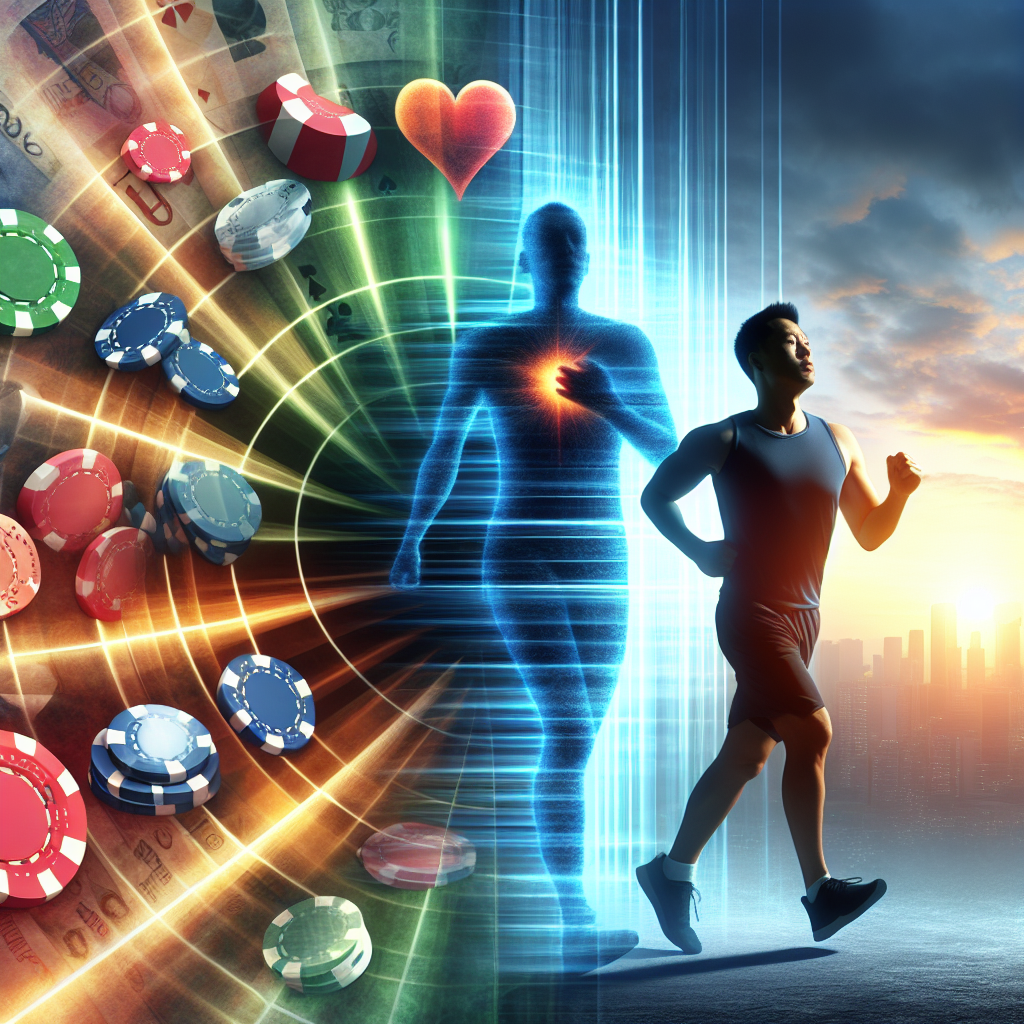-
Table of Contents

“Exercise: Strengthening the Body, Empowering the Mind, Overcoming Gambling Addiction.”
Introduction
Exercise plays a significant role in gambling addiction recovery by providing both physical and psychological benefits that aid in the healing process. Physically, regular exercise helps to reduce stress, anxiety, and depression, which are common triggers for gambling behavior. It promotes the release of endorphins, the body’s natural mood lifters, which can improve overall well-being and reduce the urge to gamble. Psychologically, engaging in physical activity can serve as a healthy distraction, redirecting focus and energy away from gambling. Exercise also helps to establish a routine and structure, which can be crucial for individuals in recovery. Additionally, participating in group sports or fitness classes can foster social connections and support networks, further aiding in the recovery journey. Overall, incorporating exercise into a comprehensive treatment plan can enhance the effectiveness of gambling addiction recovery efforts.
The Role Of Physical Activity In Reducing Gambling Cravings
Exercise has long been heralded for its myriad benefits, from improving physical health to enhancing mental well-being. However, its role in aiding recovery from gambling addiction is a relatively new area of exploration. As we delve into the impact of physical activity on reducing gambling cravings, it becomes evident that exercise can be a powerful tool in the journey toward recovery.
To begin with, engaging in regular physical activity can significantly reduce stress levels, which is crucial for individuals battling gambling addiction. Stress is often a major trigger for gambling behavior, as individuals may turn to gambling as a coping mechanism. Exercise, particularly aerobic activities like running, swimming, or cycling, stimulates the production of endorphins, the body’s natural mood elevators. These endorphins help to alleviate stress and promote a sense of well-being, making it easier for individuals to resist the urge to gamble.
Moreover, exercise can serve as a healthy distraction from gambling cravings. When individuals immerse themselves in physical activities, they are less likely to dwell on thoughts of gambling. This shift in focus can be particularly beneficial during the early stages of recovery when cravings are often at their peak. By channeling their energy into exercise, individuals can create a positive routine that not only keeps them physically fit but also mentally engaged.
In addition to reducing stress and providing a distraction, exercise can also help to rebuild self-esteem and confidence, which are often eroded by the destructive nature of gambling addiction. Many individuals struggling with gambling addiction experience feelings of guilt, shame, and worthlessness. Participating in regular physical activity can foster a sense of accomplishment and self-worth. Achieving fitness goals, no matter how small, can instill a sense of pride and boost self-esteem, making it easier for individuals to believe in their ability to overcome addiction.
Furthermore, exercise can improve sleep patterns, which are often disrupted by gambling addiction. Poor sleep can exacerbate feelings of anxiety and depression, making it more challenging to resist gambling urges. Regular physical activity has been shown to promote better sleep quality and duration, helping individuals to feel more rested and emotionally balanced. This improved sleep can, in turn, enhance their ability to cope with cravings and make healthier choices.
Another significant benefit of exercise in gambling addiction recovery is its potential to foster social connections. Many forms of physical activity, such as team sports, group fitness classes, or hiking clubs, provide opportunities for social interaction. Building a supportive network of friends and peers who share similar interests can be invaluable in the recovery process. These social connections can offer encouragement, accountability, and a sense of belonging, all of which are essential for long-term recovery.
Lastly, it is important to recognize that while exercise can be a powerful tool in reducing gambling cravings, it is not a standalone solution. A comprehensive approach to recovery should include professional counseling, support groups, and other therapeutic interventions. However, incorporating regular physical activity into a recovery plan can significantly enhance its effectiveness.
In conclusion, exercise plays a multifaceted role in reducing gambling cravings and supporting addiction recovery. By alleviating stress, providing a healthy distraction, boosting self-esteem, improving sleep, and fostering social connections, physical activity can be a cornerstone of a successful recovery journey. For those struggling with gambling addiction, embracing exercise can be a transformative step toward reclaiming their lives and achieving lasting well-being.
How Regular Exercise Can Enhance Mental Health During Gambling Addiction Recovery
Recovering from gambling addiction is a multifaceted journey that requires a combination of strategies to address both the psychological and physical aspects of the disorder. One often overlooked but highly effective component of this recovery process is regular exercise. Engaging in physical activity can significantly enhance mental health, providing a robust foundation for overcoming gambling addiction.
To begin with, exercise has a profound impact on the brain’s chemistry. When you engage in physical activity, your body releases endorphins, which are natural mood lifters. These endorphins can help counteract the feelings of depression and anxiety that often accompany gambling addiction. By elevating your mood, exercise can make it easier to resist the urge to gamble, as you are less likely to seek out gambling as a way to escape negative emotions.
Moreover, regular exercise can improve cognitive function, which is crucial for making better decisions and maintaining self-control. Gambling addiction often impairs judgment and decision-making abilities, leading to a cycle of poor choices and regret. Physical activity, particularly aerobic exercise, has been shown to enhance brain function by increasing blood flow and promoting the growth of new neural connections. This cognitive boost can help individuals in recovery think more clearly and make more rational decisions, reducing the likelihood of relapse.
In addition to its direct effects on the brain, exercise also offers a valuable distraction from gambling urges. When you are focused on a physical activity, whether it’s running, swimming, or lifting weights, your mind is occupied, leaving less room for thoughts about gambling. This diversion can be particularly beneficial during the early stages of recovery when cravings are often at their strongest. By establishing a regular exercise routine, you create a structured environment that can help you stay committed to your recovery goals.
Furthermore, exercise can improve sleep patterns, which are often disrupted in individuals struggling with gambling addiction. Poor sleep can exacerbate feelings of stress and anxiety, making it more difficult to resist the urge to gamble. Regular physical activity has been shown to promote better sleep quality by helping to regulate your body’s internal clock and reduce stress levels. A good night’s sleep can leave you feeling more refreshed and better equipped to handle the challenges of recovery.
Another important aspect to consider is the social benefits of exercise. Many forms of physical activity, such as team sports or group fitness classes, provide opportunities for social interaction. Building a supportive network is crucial for anyone in recovery, as it offers emotional support and reduces feelings of isolation. Engaging in exercise with others can help you form new, healthy relationships that reinforce your commitment to staying away from gambling.
Lastly, the sense of accomplishment that comes from regular exercise can boost self-esteem and confidence. Achieving fitness goals, no matter how small, can provide a sense of purpose and pride. This newfound confidence can spill over into other areas of your life, making it easier to tackle the challenges of recovery with a positive mindset.
In conclusion, regular exercise offers a multitude of benefits that can significantly enhance mental health during gambling addiction recovery. From improving mood and cognitive function to providing a healthy distraction and fostering social connections, physical activity is a powerful tool that can support and sustain your journey towards a gambling-free life. By incorporating regular exercise into your recovery plan, you can build a stronger, healthier foundation for long-term success.
Q&A
1. Exercise can help reduce the cravings and urges associated with gambling addiction by releasing endorphins, which improve mood and reduce stress.
2. Regular physical activity can improve overall mental health, providing a healthy coping mechanism and reducing the likelihood of relapse in individuals recovering from gambling addiction.
Conclusion
Exercise positively impacts gambling addiction recovery by reducing stress, improving mood, and providing a healthy outlet for energy and focus. It can help rewire the brain’s reward system, decrease cravings, and improve overall mental and physical health, which are crucial for long-term recovery.



